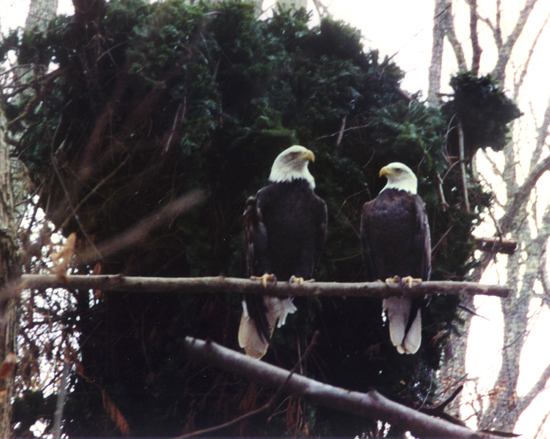[/av_textblock] [av_textblock size=” font_color=” color=” custom_class=”] FOR IMMEDIATE RELEASE
May 25, 2005
CONTACT: Al Cecere, President
American Eagle Foundation
PIGEON FORGE, Tenn.— A four-week-old bald eaglet that hatched at the Columbus (Ohio) Zoo and Aquarium has been placed under the foster care of unrelated eagle parents that reside at the American Eagle Foundation (AEF) birds of prey center in Pigeon Forge, Tennessee.
The youngster, produced by the zoo’s bald eagle pair “George” and “Barbara”, arrived in the Volunteer State on May 18th, right after an accidental leg injury left its natural father unable to help raise it. Two eagle parents were still needed to diligently feed and brood the baby bird.
“Liberty” and “Justice,” an experienced non-releasable bald eagle breeding pair living in the AEF’s “Eagle Mountain Sanctuary” exhibit, located on the Dollywood family adventure park, are now nurturing and rearing the eaglet. The pair was selected to provide special foster care to the chick after their own three eggs had proved to be infertile.
“As soon as the eaglet was placed in its new nest, these great parents lost no time treating it like one of their very own,” said Al Cecere, founder and president of the AEF. “It’s a wonderful sight to see.”
Over the next two weeks, the eaglet and its new foster parents can be viewed on an Internet video cam, as they lovingly interact as a family unit, by visiting the AEF’s www.eagles.org website and clicking the Eagle Cam button.
The AEF had already been scheduled to release the Columbus Zoo bird in July (at 12 or 13 weeks of age) from the organization’s hacking facility on Douglas Lake in the foothills of the Great Smoky Mountains. However, after “George” received the injury, he had to be temporarily removed from the Columbus Zoo’s eagle aviary for vet treatment. Zoo officials then deemed it necessary to move the eaglet to Tennessee earlier than planned to ensure the best possible care by qualified parents.
“Liberty” and “Justice” have previously proven themselves to be good parents by successfully hatching and rearing 13 young since 1993. After the pair’s own three eggs did not hatch in May during the usual 35-day incubation period, AEF officials removed the eggs and immediately replaced them with an empty broken eggshell and the 30-day old Columbus Zoo eaglet.
This is not the first time that the AEF and Columbus Zoo have joined forces. In a few weeks, the new eaglet will join 13 other bald eaglets from the Columbus Zoo that have been previously released into the wild since 1992 from the AEF hacking facilities in the Great Smoky Mountains area. Two other Columbus Zoo eaglets have been hacked by the Tennessee Wildlife Resources Agency (TWRA) in another part of Tennessee.
The AEF’s work with the new eaglet will culminate once the bird reaches full size at 12-13 weeks of age and is released into the wild to fly for the first time. The preservation group has hatched three other bald eaglets and a golden eaglet this spring that will be released during the summer. It also expects to receive and release two more eaglets from another zoo.
After bald eagles reach sexual maturity at 4-5 years of age, they tend to return to nest within the general region of their first flight. Both male and female parent eagles take turns sitting on eggs, hunting for food, and guarding the nest, as well as feeding and brooding their young.
The AEF located in Pigeon Forge, Tenn., is dedicated to the recovery and protection of bald eagles and their habitat. Since 1985, the AEF has contributed to releasing a majority of the 294 bald eaglets from seven Tennessee hacking sites in cooperation with the TWRA and U.S. Fish & Wildlife Service. Since 1992, the organization has released 80 captive-hatched eaglets into the foothills of the Great Smoky Mountains area on Douglas Lake. It operates the largest bald eagle captive breeding program in the world.
The AEF provides daily year-round care to more than 70 non-releasable North American birds of prey, including 35 bald and golden eagles, and has conducted/supported various public education and eagle projects in a number of States.
###
[/av_textblock]
